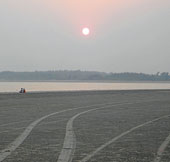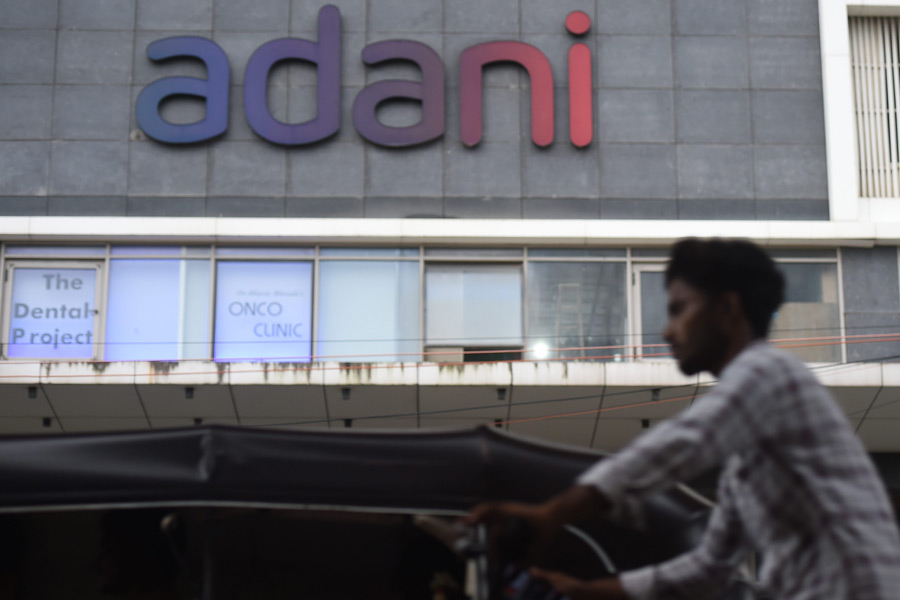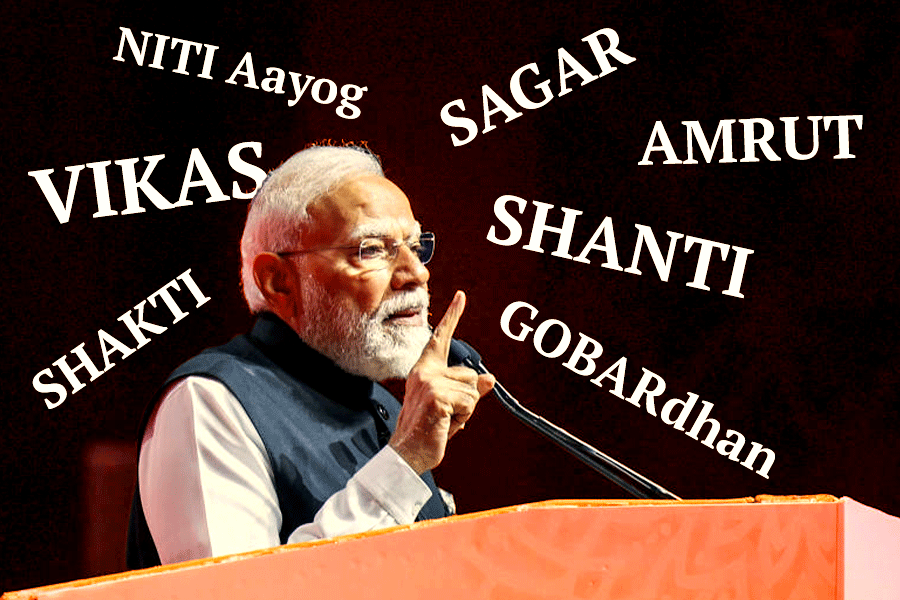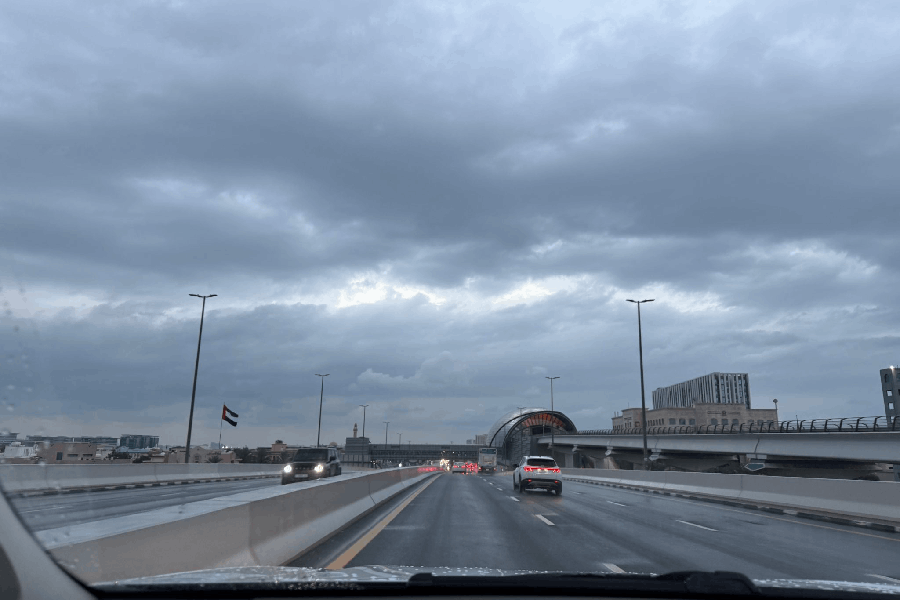 |
| Tyre marks on the Mandarmani beach. Pictures by Jayanta Basu Garbage is often dumped on the beach |
After a 6km dust-road journey, the car clambers up and down its last high hurdle and the sea sweeps into view. Ah, the sea, the sea. Almost soundless, rippling mildly in the afternoon sun. The car — a Sumo, aptly named perhaps with this journey in mind — swerves right with the sea to the left and shacks and colourfully painted hotels dotting the other side. Tacky and yet inviting, the sea a handshake away from their wicker gates.
The car rolls along the beach, dirty white sandy and hard, smoother than most Calcutta roads. Here the beach is the road and the road the beach, end to end across the 14km expanse. Calcuttans descending here on shotgun vacations vroom through to whoops of joy, such freedom they have rarely smelled as they do in the breezy air that sluices into their nostrils.
Mandarmani is hard to believe at first glance. So close to slummy Digha, only 15km to the west, and yet. The hotels are inviting, the sealine perhaps less than 100 metres away. And so illegal they seem even more tempting. The taste of sharing in crime unknowingly, ignorantly. Well, it’s just two days.
Between 2001, when Sushil Bera, a Bengali businessman engaged in prawn farming, set up Samudrabilas, the first hotel to come up in Mandarmani, and now, close to a hundred hotels have opened in this East Midnapore resort. Almost all of them are illegal, having violated the Environment Protection Act that bars any commercial activity within 500 metres of the maximum high-tide point.
Throwing sand in the eyes of the law on this scale has not occurred anywhere in this country. The only law that is followed here is hick-town law: each to his own and may the devil take the hindmost.
Money, money, money
On a rough estimate over Rs 500 crore is riding on the sea-swelled boom at Mandarmani. Swept up in the wave of this cash flow are the local panchayat and political leaders while the administration ducks under the rising tide. The government makes its presence felt through its absence. Since it’s nowhere to be seen, it must be there somewhere. Like God.
In August 2006, the pollution control board passed a closure order against eight hotels, which had been built flouting the 500-metre restriction without permission from the coastal regulation zone authority. The pollution control board’s green signal wasn’t sought either.
One of the hotels appealed to the state pollution appellate authority — a quasi-judicial body above the pollution control board. After an inquiry, it directed the shifting of all illegally constructed hotels. But the shifting never took place. Not only that, illegal construction has gone apace.
 |
| Garbage is often dumped on the beach |
Disha, a non-government organisation, moved Calcutta High Court in 2007 against the government accusing it of failing to enforce the law. The following year, the court passed a directive barring further construction in the coastal regulatory zones till the disposal of the petition. But the administration made no effort to implement the order.
The environment department filed a fresh FIR against another 53 “upcoming units” and the local Ramnagar police station initiated cases against some but to no avail. Disha, which represents the interests of local fishermen, refuses to give up and the environment department is now planning to move a case of contempt against the hotels.
M.L. Meena, the environment secretary, said: “We will soon submit an affidavit in the high court based on a recent report sent by the district magistrate of East Midnapore confirming that illegal hotel construction is still going on.”
By the government’s own admission, hotels continue to be built between the high-tide and low-tide points. If you’re lucky, you could find yourself getting stranded in a hotel with high-tide water lapping against your feet.
“In a similar situation in Goa, many hotels were actually demolished; nothing is happening in Mandarmani with the administration turning a blind eye,” said Santanu Chatterjee of Disha.
The administration doesn’t turn a blind eye. It encourages the illegal practice. The story goes that when the pollution control board threatened to demolish the hotels, fisheries minister Kiranmoy Nanda, who belongs to the West Bengal Socialist Party, warned its officials against taking any such step in the presence of environment minister Sailen Sarkar.
Debdulal Das Mahapatra, the secretary of the Mandarmani hoteliers’ association, said: “We have built the hotels with the panchayat’s permission and despite requests for an amicable solution, never received any cooperation from the government. Let the case continue.”
Till 2008, the local Ramnagar panchayat, ruled by the CPM, issued more than 150 permissions to set up hotels, the tempo picking up from 2004-05. With the winds of change blowing in Bengal, the Trinamul Congress wrested the panchayat last year but it seems in Mandarmani the change is only in the wind, as it is proving in many other places.
Sitangsu Giri, the Trinamul panchayat head, said: “We have allowed around 30 clearances to hotels since coming to power. However, we have not issued any clearances since the high court order was passed in 2008.”
Even those 30 clearances did not follow the coastal zone law. Giri asserted that fresh construction had stopped but the block development officer, Krishnada Haldar, said: “I have taken photographs of work going on at night.”
“What can I do? There is strong local support with all parties coming together.”
“What can we do? Our police station is 20km away from Mandarmani,” added an officer of Ramnagar police station.
Change, what change? Change, of some sort, is evident, though. The price of land has increased 20 times between 2003-2004 and 2007, with a cottah selling for around Rs 80,000 on last count.
What we can do
Enforcing the law may not be God’s calling. But building roads, electricity connections and sewer lines is believed to be the government’s responsibility. None of these exists in Mandarmani. The last 6km to the resort is a wavy dirt road that could break the axle of a small car. All hotels are powered by smoke-belching diesel generators, the better among them running the machines 24 hours.
A recent tourist from Calcutta while walking on the beach in the morning spotted something shiny being rolled back and forth by the frothy edge of waves on the shore. It was a light bulb. When shown, a hotel worker expressed little sign of surprise but made some noises about irresponsible people throwing things around. With no sewage lines and no municipality to collect the garbage produced by a hundred hotels, it will not be wild to presume that everything is being dumped into the sea when no one is looking.
Traditionally a fishing village, Mandarmani has over 5,000 fishermen in and around it who make their living from the sea and can see what’s happening to it. The fishermen say the fish have retreated into the deep sea with the water near the shore getting polluted. “The pollution is of such level that 1kg of plastic is dredged in by the net for every 30kg of fish,” said Debasish Shyamal of the fishermen’s association.
As fishermen worry about survival, the hotel boom has sucked a section of the local population into its economic circle. Families have built shacks that sell tea, snacks and bottled water. Some may be clandestinely hawking liquor too.
Local men drive the motorised three-wheel rickshaw that carries passengers on a flat plank of wood fixed to the body of the vehicle. If you’ve not driven down to Mandarmani, this bone-rattler will be your transport up and down the beach that ends on one side at the confluence of river and sea.
“There will be riots if anyone tries to demolish hotels,” said one such driver, a young man whose mother runs a shack on the beach, selling sugary tea. Mandarmani could turn into another Nandigram, suggests the tone of his voice.
A senior government official admits Mandarmani is too far gone. “It is virtually impossible now to completely undo the wrongs that have been committed in Mandarmani with such huge finance already involved. Perhaps all concerned should make a sincere effort to limit the damage and violations.”
If this position is accepted, the way forward may be to grant amnesty to many of the properties that have come up. The date of the high court order of 2008 could be the cutoff point till which to declare the amnesty and any hotel built after that demolished. That will reduce the pain for the industry and make the task less daunting for an action-shy administration while at the same time not entirely binning the rule of law and making sure the regulations are followed from now on.
The arm of the law doesn’t reach where the footsteps of the administration aren’t evident — it’s a lesson as apparent in Mandarmani as in Lalgarh. Building the road, reaching power and creating a waste disposal system constitute the administrative action that can’t wait for the laborious business of re-establishing the authority of law to conclude.
Biswajit Mukherjee, the chief law officer, environment, however, said: “If nothing can be done about illegal encroachment by hotels in Mandarmani, it will be difficult to impose coastal laws elsewhere.”
Possibly true. In the meantime, Mandarmani would welcome a few bins to chuck plastic packets into.
Mahapatra, of the hoteliers’ association, is conciliatory. “We are open to all kinds of suggestion as we have started to realise that, legalities or no legalities, Mandarmani will not survive environmental disaster in the long run if things go on like this.”
But things are likely to go on like this until a destroyer god bearing the bejewelled heavenly flower, Mandarmani, churns the sea for poison.










